The entire first season of Treme has been building to Episode 8 (“All On a Mardi Gras Day”). Creighton Bernette (John Goodman) has talked it up on his YouTube videos. Antoine Batiste (Wendell Pierce) has been awaiting it eagerly. And Big Chief Albert Lambreaux (Clarke Peters) has spent months in preparation. It is the most iconic image outsiders have of New Orleans: parades, costumes, masks, beads and debauchery. And it’s apparently just as important to N’awrlins’ conception of itself.
So what does Mardi Gras mean to the residents of Faubourg Treme?
Feast of Flesh
For the international audience: Fat Tuesday, or “Mardi Gras,” is the last Tuesday before the Christian season of Lent. Lent is the forty days leading up to Easter, the day on which Jesus is said to have risen from the dead. Lent begins on Ash Wednesday, a day of sobriety and mourning. And Lent itself is a period in which Christians enter a period of deprivation, offering up their suffering to God. As such, Fat Tuesday is the last chance a good Christian has to enjoy the pleasures of the flesh.
And in New Orleans, they don’t screw around.
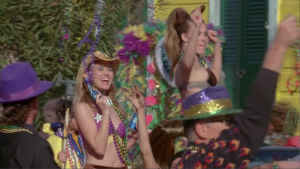
Good afternoon, ladies.
New Orleans’ tradition of celebrating Mardi Gras in force dates back to the 1830s. It’s an integral part of the city’s identity. It’s also a huge tourism boom, one of New Orleans’ few sources of income that isn’t fished out of the Gulf of Mexico. For a city that thrives on art – and for a show that focuses on artists – Mardi Gras is a big deal.
Most of the tourists, and many of the locals, go costumed to Mardi Gras. The costumes are not Christian or Lenten-themed. Davis McAlary (Steve Zahn) dresses up as Captain Jacque Lafitte; Janette Desautel (Kim Dickens) puts on a tutu, tiara and magic wand. Some people put on masks, but the masks are largely an affectation. Bernette and his family are recognized, even under blue domino masks and tarps. Annie recognizes Tom McDermott (the piano player who gave her a gig in Episode 03, “Right Place, Wrong Time”) despite his wearing a giant horse head.
The costumes and masks don’t obscure anything. All the locals know each other. So why bother?
“Be good” is the most frequent invocation we hear on Mardi Gras. It’s not said as a warning, but as gentle Horatian satire. “Act out, but don’t do anything too crazy,” seems to be the implication. Mardi Gras gives implicit permission to act out for a day, breaking laws, customs and common sense guidelines. When you put on the mask, you abandon your traditional identity. You are encouraged to act as someone other than yourself for a day. When the mask comes off, you go back to the status quo.
Which is ironic for Treme. Masking on Mardi Gras doesn’t give our protagonists false identities. Rather, it strips away the false identities and shows us who they really are.
Delmond Lambreaux (Rob Brown) starts the episode frustrated with his father, as usual. He planned to have moved on from New Orleans by Mardi Gras, probably to perform in some other gig. As Fat Tuesday progresses, however, his attitude changes. Awakened by the gentle serenade of topless girls demanding beads outside his balcony, he gets into the swing of things. He chats up a pretty young girl at a party. He sits in on a gig and plays that New Orleans boogie-woogie he’s been avoiding all season (see Episode 7, “Smoke My Peace Pipe” in particular). And when he sees a line of Mardi Gras Indians marching down the street, he’s stunned into silence. This is one of Treme‘s more predictable arcs: Simon and Overmyer have been setting Delmond up for a N’awrlins reawakening all season. But Mardi Gras’s the only day it could happen.
Sonny takes the opportunity to “spend some time apart.” He blows off a planned date with Annie to cruise the party scene and get high. “Be good,” he says sarcastically as he leaves, “or don’t.” Donning a sequined gold bird mask, Sonny follows his own advice: making out with a girl in the Rex parade, copping free drinks at a bar in the French Quarter, then going home with a saucy wench who supplies him with coke. Sonny had been repairing his behavior somewhat. He’d come back to Annie, apologizing for his disrespect and physical abuse. Apparently the effort tired him out.
(Tangent: this is the third episode in which the idea of Sonny saving someone’s life during the storm has come up. In none of the three cases has the anecdote been sold with any candor. Is Sonny bullshitting about being a Katrina hero? If so, who’s the guy who bought him a drink? And why does he keep it up?)
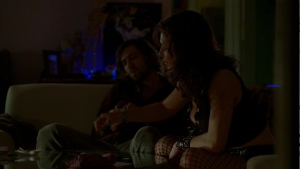
He can technically get absolved for it tomorrow.
Antoine starts the day as a dutiful baby-daddy, bringing his girlfriend and child out to the parade route. But when the baby starts acting up, Antoine is left to his own devices. He soon runs into Ladonna (Khandi Alexander) on her way to her bar. He tags along and helps serve the army of customers. The evening ends with Antoine massaging a kink out of Ladonna’s back, sharing a cup of whiskey while Aaron Neville’s “Tell It Like It Is” plays in the background. Not only is this classic seduction material, but it’s especially ironic given that, earlier in the episode, Antoine was swearing to Aaron Neville’s nephew Ian that “under no circumstances” would he work on Mardi Gras day. And not only was he working behind the bar – taking orders, pouring drinks, and making change – but he was workin’ it. Though he probably didn’t mean the latter case.
(Seriously, Overthinkers: put some Aaron Neville on the stereo and rub your lover’s back and tell me if that doesn’t work wonders)
It takes two to Tipitina, of course; Ladonna’s a willing participant in the seduction. She has not told anyone yet that she’s discovered her brother’s body in a temporary morgue under a wrong name. She’s been keeping this secret for days, from both her mother and her husband. They both notice the tension in her posture and ask if something’s wrong. She lies both times. Only on Mardi Gras, under the influence of whiskey and Antoine’s skilled hands (“you carryin’ it all right here”) can she abandon the pretense.
Annie and Davis run into each other by chance. Davis captivates Annie with his rakish charm and leads her on a tour of what the city has to offer. She goes on an adventure that leads to several parades, a restaurant and a house party. It ends with one of those touching intimacies you can only share with a stranger: the two of them anointing each other’s foreheads with ashes in the street outside a church. They both know that they belong to other people. But they also know that they’re free enough – Annie through Sonny’s neglect; Davis through the informal nature of his courtship with Janette – to follow the day where it takes them. And Mardi Gras has that uninhibiting effect on everyone. There’s a moment, right at the end, when it seems like the two of them might go home together. But either Annie decides or Davis backs down, and they part on civil terms.
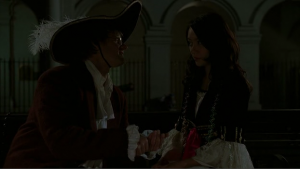
Not every Mardi Gras story ends happily. Creighton starts the day tickled pink about the parade. But he grows disheartened that his favorite attractions have not returned. Soon he begins dragging his feet and eventually begs off, heading home early. He drinks alone, retiring to his guest house to struggle with his novel. He eats his red beans and rice with the sullenness of a toddler. And he records a YouTube video that drips with despair.
Living here now is like a dream. The way that everything in a dream is the same, yet not the same. Familiar, yet strange. Not quite right, but you just can’t put your finger on it. New Orleans was a soap bubble, and it had a hell of a run. But now it’s done. Whatever comes next is just a dream of what used to be.
And what about Janette? After weeks of ducking creditors, swearing at her failing equipment and struggling to make ends meet, Janette gets to do what she loves. She cooks in her rolling kitchen, serving gumbo and beignets to passerby. Once her stocks are cleaned out, she changes into a fairy princess costume and flits about. Unencumbered by responsibility, she darts from party to party, catching up with friends. She ends the evening dancing on a street corner, ready to go home until she attracts more strangers to follow her. She is free.
All the main characters in Treme have worn masks at various points through this season. Mardi Gras gives them an excuse to put on actual masks. In doing so, however, they strip away the masks they’ve worn and reveal their true character. Sonny is not getting better; he’s still an asshole. Creighton is not a boisterous hero; he’s a deeply depressed patriot. Janette’s at her happiest when she’s cooking and socializing. And Davis is a fundamentally decent human being. Maybe everyone’s tired of making up fake identities. On the one day that fake identities are encouraged, they pick up their true faces instead.
It’s no coincidence that nobody’s masks work. Davis passes himself off as Jean Lafitte, only to be reminded by his mother that Lafitte was a slave trader. Annie dresses as a wench, but that doesn’t stop Davis from recognizing her. And we see Sonny and Creighton literally strip their masks off before showing their true colors. The effort of having a piece of cheap plastic in front of their face is too much for them.
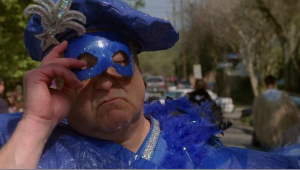
So what comes next? Will the unmasking brought on by Mardi Gras lead to a new era of honesty for our heroes? Somehow I doubt it. After every Fat Tuesday comes Ash Wednesday. The weight of the world comes crashing back. The ashen cross on our forehead reminds us that we are but dust, and to dust we shall return. Who would want to live with that? Who could get up and work every day if they told themselves that every morning? Better to put on a mask. Better to pretend to be the faithful wife, or the unattached slacker, or the patient boyfriend. Better that than the ashes.
Sorry content’s kind of light this week, but missing an episode on Memorial Day threw me off. Sound off in the comments if there’s other parts of this episode you want to discuss.
Next installment of Overthinking Treme will be the final one, covering all ten episodes. Hope you’re ready.
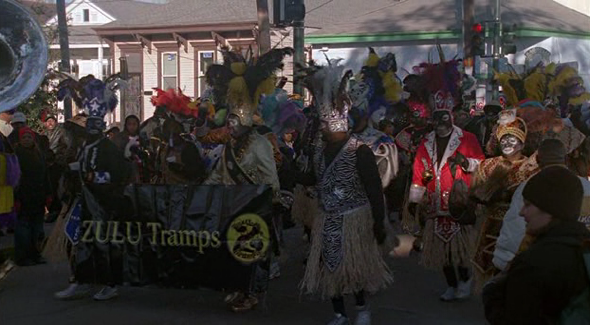
Before they burned out, James Crotty and Michael Lane published a series of travel guides under the brand “Monk” which were incredibly insightful looks at various places as they existed in the late 1990s. They had a nice comment about New Orleans to the effect that this was the place where all the detritus from the Midwest and parts of the South washed up before heading into the Gulf.
I recommend going to Mardi Gras in New Orleans once, though you are sort of cured of the desire to go there after going through a couple of Carnivals in just about anywhere in Brazil.
I’ve talked to a couple of people from New Orleans, and they always told me that they mostly associated Mardi Gras with annoying tourists. Of course, this was just a couple of people – but did Treme go into that aspect at all?
I felt the depiction of everyone getting ready on Mardi Gras morning was accurate. You get dressed, fueled up with some breakfast, and head out to where the day may lead you. Loved it!